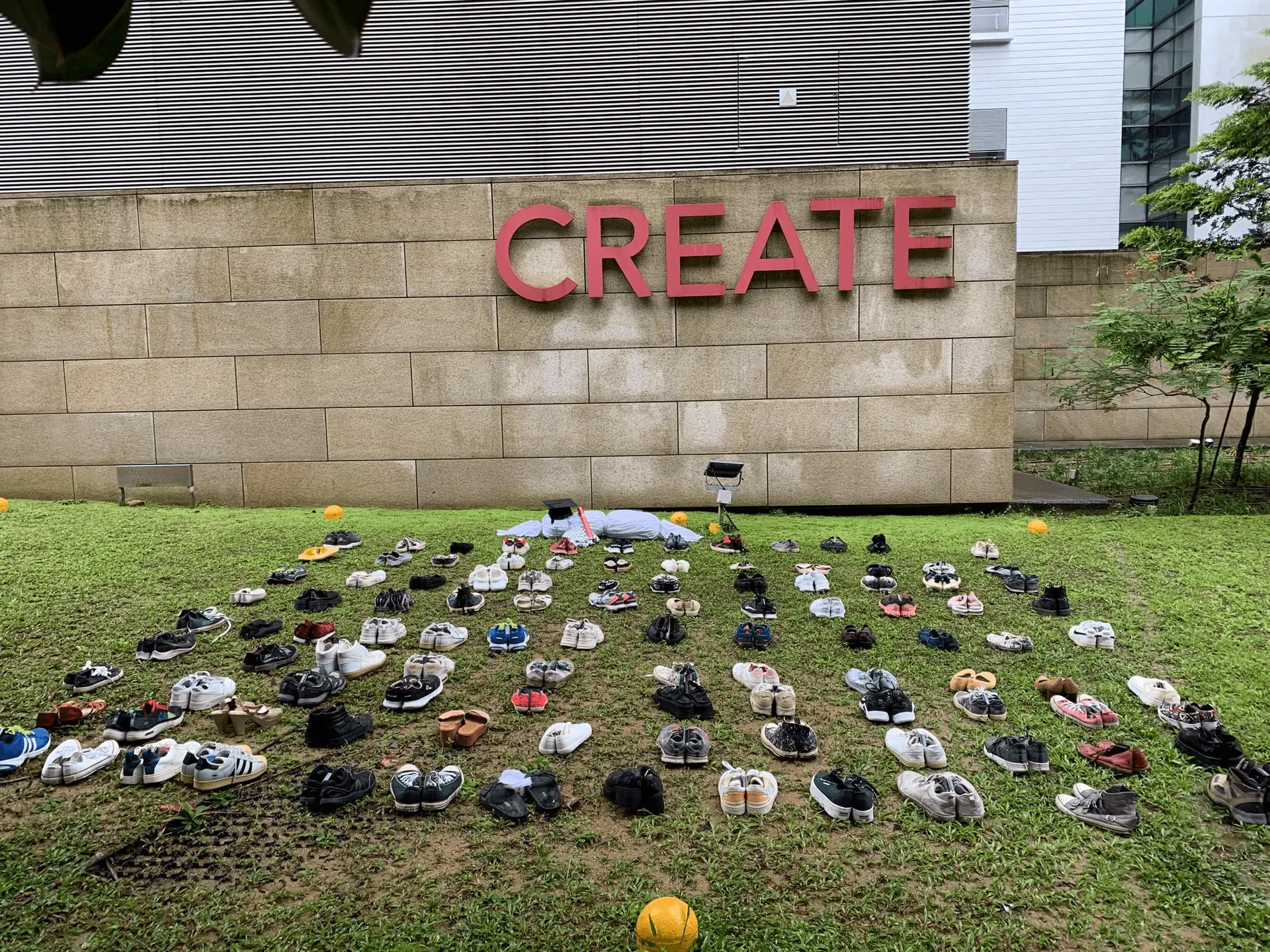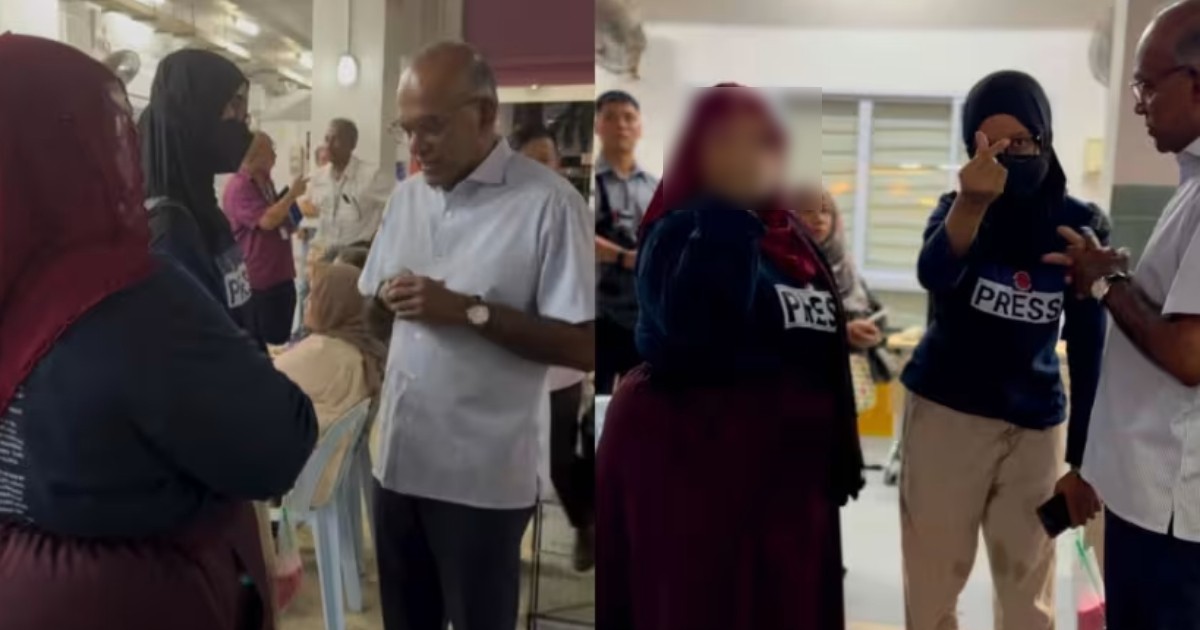Feature photo: FACEBOOK/K Shanmugam
A viral video of two hijabi ladies confronting Minister K Shanmugam about POGMA during his Meet-the-People-Session (MPS) is making its rounds lately.
For those who are not in the know, you can watch the video and read the original post on the right.
Central to the entire confrontation was about the antagonistic way that the ladies have represented themselves, with either the ladies (and one other person who are accompanying them), calling the minister a “liar” and “coward”. One of the ladies even flashed a middle finger to the camera.
The Aftermath
MP Shanmugam also identified the two ladies as part of a group called Monday for Palestine Solidarity. Until recently, the Instagram account featured several photos of two Hijabi ladies, wearing glasses with similar build, without their mask on, but those photos had, at the time of this writing, been taken down before we got the chance to capture the photos. Instead, the account has since put up a post denying their initiation of the MPS incident.
However, in the same post, the MPSolidarity (let’s call them that to differentiate from the real MPS aka Meet-the-People-Session) went on to speak about other MPS that they were involved in, where they had attempted, sometimes failing, to put their issues forward to the respective MPs.
The Sisters’ Statement
On top of that, the ladies (later identified as sisters) issued their own lengthy statement. In summary, while they admitted that they are supporters of the Monday of Palestine Solidarity, they claimed that they are there at the MPS at their own capacity, to speak about the different matter: POFMA. They argued that they were very polite and non-confrontational at first, but when they realised they were being filmed and recorded, they felt intimidated and panicked, thus leading to the outcome of the video. They also felt that the post by Minister Shanmugam was one sided, and have left out much of the whole session of their discussions.
They ended their statement with the 8th verse of Surah Al-Ma’idah:
O you who have believed, be persistently standing firm for Allāh, witnesses in justice, and do not let the hatred of a people prevent you from being just. Be just; that is nearer to righteousness. And fear Allāh; indeed, Allāh is fully Aware of what you do.
Where Things Might Have Gone Wrong
The incident have not bid well for the sisters and Pro-Palestinian activist group. There is significant backlash from the leaders of the community. Singaporeans are also reacting negatively to the actions of the two sisters. However, there is also significant support within the community, because of the perceived unfairness that only Minister Shanmugam was able to video and record the incident, while they are not allowed to.
For us @ KOPIŌ, it proves to be a good learning point from the perspective of marketing, public relations and branding. Here is a list of what we felt are their own missteps:
1. Not apologising for their antogonistic actions and middle-finger gesture
The crux of the backlash lies in the antagonistic way they address the minister, supposedly after they find themselves being filmed. The middle finger gesture was especially shocking, considering that it was done by someone who is representative of the Muslim community, while in the middle of Ramadan.
What is even more curious is that there is not a single acknowledgement made for that mistake in either the sisters’ or the MPSolidarity’s statements. No apology, no regret, no remorse… NOTHING! This, in itself, destroys any chance of gaining sympathy from the more neutral viewers to their cause. Without acknowledging and addressing the concern of the average person properly, you lose your credibility quickly.
This is actually similar to the initial response that was given by the Government themselves during the recent NRIC saga. Instead of acknowledging and apologising, they made a statement that implies that the government is exempted from PDPA. While it is technically true, it gives the impression that the government is above the law, and rubbed the wrong way to the members public.
2. Ignoring cultural sensitivities as a Muslim
Hijabi, Ramadan, shouting hostilities, and giving the finger? Not a good mix.
Supporters of the sisters might argue that, even if they are hijabis, it is unfair to make them “represent the entire Malay Muslim community”. However, consider also the reaction of the community to Mangobossku’s viral mobile phone smashing stunt. Another example will be lawyer cum influencer Rudy Marican’s controversial remarks on marriage, where he criticises some higher education women for marrying a man who cannot pass their O-levels.
Despite the different context and situations, the common thread still applies: Muslims behaving inappropriately unIslamic, especially during Ramadan, should not be the norm, as it goes against with the teachings of the Prophet (SAW), when he himself had said: “The most beloved to me amongst you is the one who has the best character and manners.” (Sahih Bukhari).
Need a more contemporary context? “Manners maketh man.”
3. Not making their statements simpler to consume and understand
Minister Shanmugam had one advantage in his message: visual support via video.
In an age where video, or at least visual design is key to help people consume information, a long and lengthy Google document does not help with their attempt to correct perseptions. And even if one may argue that MPSolidarity have posted “images” on Instagram, those images are mainly made up of texts.
As social media content creators, we are painfully aware of shorter attention span of social media consumers. Texts will only increase the cognitive load needed to understand the point they are trying to put across ie it takes far more effort to understand text, especially lengthy ones, than it is to consume videos or even static visuals.


Visual statement (top) by Students for Palestine Singapore vs text statement by Monday of Palestinian Solidarity. Which one ended up grabbing more attention, creates less backlash, and gains more sympathy?
The group may argue that their ability to represent themselves through videos or graphics is severely limited by restrictions, such as the one placed on them when Minister Shanmugam seemingly restricted their chance to make their own recording. However, visual support does not necessarily mean that you need to rely on actual footage or graphics. As mentioned, visuals are meant to carry forward a message more effective. From our own experience, something as simple as icons can be a great way to represent a message effectively and create better impact to the message.
4. Attempting disassociation and relinquishing perceived responsibility
Several photos of the sisters have been deleted off Monday of Palestine Solidarity Instagram account, which may not lessen any of the impact of the backlash. Instead, it can be perceived as skiving responsibility, or even worse, an attempt to throw your own people under the bus.
Before this incident, little is known about the movement. In fact, most of us are not even aware of their existence. This would have been a great opportunity for the members to build their branding by putting their identity to light, in a way that make them relatable to the members of public: ordinary Singaporeans from various backgrounds who are, as we can deduce from the Quranic verse earlier, on the side of justice, whether Palestine or POFMA.
The Changing Landscape of Engagement
There is one thing that the sisters, and, in a sense, groups like MPSolidarity, and Students for Palestine Singapore, has done successfully: they have hinted that the political landscape of engagement has changed.
One key takeaway from all this is that the people are no longer satisfied with the current “avenues of advocacy” and channels of outreach. The government own feedback platform, REACH, may technically served its purpose. However, it remains to be proven that it can sufficiently address a generation who are more concerned about a new set of issues, and who communicates and responds differently from older generation voters. With the upcoming election, the new government should consider placing this earlier in their pipeline.
Take away lessons
This incident have served some valuable lessons for any sort of organisation, whether public or private, profit or not. From our standpoint, we can certainly learn a few key notes:
- Acknowledge mistakes done, and show sincerity in fixing it.
- Simplify your message by leveraging on graphic design or video content.
- Take every opportunity to build your branding.
- Be aware of cultural sensitivities.
- If your narrative needs change, be clear with the reason why, instead of hiding away what you previously represent.
Have an Opinion? We would love to hear from you!
Drop us a message to feed back on this article, or to suggest any other topics for us to bring up.
Wanna have your business featured on our blog? Contact KOPIŌ to learn how we can enhance your online presence.
Explore More Stories
13 Miles Serves Up Sembawang’s Shell Out Cravings
If you’re on the hunt for a certified halal restaurant that delivers bold flavors and an unforgettable dining experience, look no further than 13 Miles. Nestled near Sembawang Shopping Centre, right at the junction of Sembawang Road and Jalan Jeruju, this...
Nasi Lemak Ayam Taliwang vs NEA Saga Simplified
In recent weeks, the saga surrounding Mr. Noorman Mubarak and his Nasi Lemak Ayam Taliwang stall at Yishun Park Hawker Centre has sparked a heated debate over Singapore’s hawker policies. What started as a dispute between Noorman and the hawker centre’s operator,...
CBD Halal Spotlight: Smashed Burger & Nasi Padang
For working professionals in Singapore’s bustling Central Business District (CBD), finding a convenient and satisfying Halal meal can sometimes be a challenge. Enter Chef Syed Shah’s BCS Smashed Burger and Nasi Padang, a Muslim-owned eatery that brings together bold...




